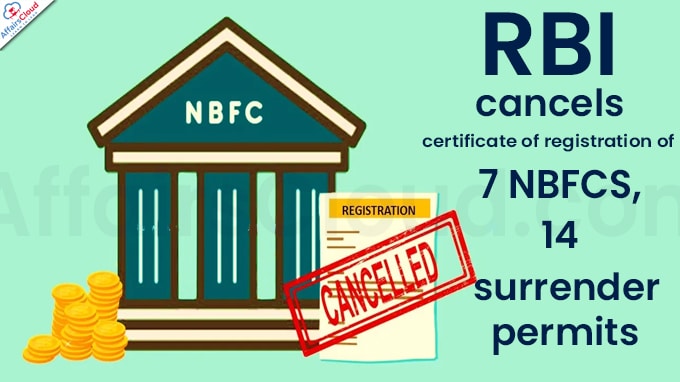 The Reserve Bank of India (RBI) in the exercise of powers conferred on it under Section 45-IA (6) of the RBI Act, 1934 has cancelled the Certificate of Registration (CoR) of seven Non-Banking Finance Companies (NBFC).
The Reserve Bank of India (RBI) in the exercise of powers conferred on it under Section 45-IA (6) of the RBI Act, 1934 has cancelled the Certificate of Registration (CoR) of seven Non-Banking Finance Companies (NBFC).
- With this, the notified companies are barred from transacting the business of a Non-Banking Financial Institution (NBFI), as defined in clause (a) of Section 45-I of the RBI Act, 1934.
The 7 NBFC are as follows:
| NBFC | Registered Office (City/State) |
|---|---|
| Coorg Tea Company Limited | Bengaluru, Karnataka |
| Trimurthi Finvest Limited | Bilaspur, Chhattisgarh |
| East West Finvest India Limited | Bilaspur, Chhattisgarh |
| J.V.Modi Securities Limited | Indore, Madhya Pradesh (MP) |
| K K Patel Finance Limited | Gwalior, MP |
| Purvi Finvest Limited | Bilaspur, Chhattisgarh |
| Genfin Capital Private Limited | Bengaluru, Karnataka |
14 NBFCs surrender their Certificate of Registration to RBI
The 14 NBFCs have surrendered the Certificate of Registration (CoR) granted to them by RBI. Thus, RBI, in exercise of powers conferred on it under Section 45-IA (6) of the RBI Act, 1934, has therefore cancelled their CoR.
1.Under this, 7 companies surrendered their licence because of exit from business while two surrendered due to meeting the criteria prescribed for unregistered Core Investment Company (CIC) that do not require registration.
- An unregistered Core Investment Company (CIC) refers to a company that operates as a Core Investment Company but is not registered with the regulatory authorities.
- A Core Investment Company(CIC) is a type of non-banking financial institution(NBFC) in India that primarily invests in shares of other companies and holds significant equity investments. However, there are certain criteria outlined by the regulatory authorities under which a CIC may operate without the requirement of registration.
2.Remaining five surrendered permits due to NBFC ceasing to be a legal entity due to amalgamation/merger/dissolution/ voluntary strike-off, etc.
- Amalgamation is the process of merging two or more companies into one, and if an NBFC undergoes amalgamation, it ceases to exist along with any associated permits becoming invalid.
- Merger, on the other hand, is the process of combining two or more companies into a single legal entity. Similar to amalgamation, if an NBFC merged with another entity, the original NBFC would cease to exist, resulting in the surrender of any permits it held.
- Dissolution refers to the formal termination or winding up of a company’s existence. If an NBFC decided to dissolve, it would cease to be a legal entity, leading to the surrender of its permits.
- Voluntary strike-off is a process where a company voluntarily requests to be struck off from the register of companies. If an NBFC chose to undergo voluntary strike-off, it would no longer exist as a legal entity, and its permits would consequently be surrendered.
The 14 NBFCs are as follows:
i.Due to exit from NBFI business:
| NBFC | Registered Office (City/State) |
|---|---|
| Lunia Trading & Investment Private Limited | Kolkata, West Bengal (WB) |
| Swastik Goods and Suppliers Pvt. Ltd. | Kolkata, WB |
| Icseva Finance Private Limited | Aurangabad, Bihar |
| Gipsy Management Pvt Ltd | Kolkata, WB |
| Shiba Fabspin Pvt. Ltd. | Kolkata, WB |
| Esar Entrade Ltd | Kamrup, Assam |
| Maba Corporate Services Private Limited | Bengaluru, Karnataka |
ii. Due to meeting the criteria prescribed for unregistered Core Investment Company (CIC) that do not require registration:
| NBFC | Registered Office (City/State) |
|---|---|
| L&T Infrastructure Development Projects Limited | Chennai, Tamil Nadu (TN) |
| Josan Deposits and Advances Limited | Kolkata, WB |
iii.Due to NBFC ceasing to be a legal entity due to amalgamation/ merger/dissolution/ voluntary strike-off, etc.:
| NBFC | Registered Office (City/State) |
|---|---|
| Melinex Investment and Finance Private Limited | Ludhiana, Punjab |
| Casablanca Broking & Agency Pvt. Ltd. | Kolkata, WB |
| Janpragati Syntex Pvt Ltd | Kolkata, WB |
| Nalimbur Mercantile Pvt Ltd | Kolkata, WB |
| Wondermax Mercantile Pvt Ltd | Kolkata, WB |
About NBFC :-
In India, Non-Banking Financial Companies (NBFCs) are regulated under the Reserve Bank of India (RBI) Act, 1934. The RBI is the primary regulatory authority for NBFCs and oversees their registration, functioning, and operations.
- NBFCs registration is obtained under the Companies Act, 2013,earlier registered under the Companies Act 1956. These institutions are engaged in offering Loans and Advances, and Acquiring stock, equities, and debts issued by the government or any local authority.
- Section 45-IA states that no NBFC can commence or carry out its business activity without acquiring an NBFC Registration.
- For all Companies currently applying for registration as a NBFC, the minimum Net Owned Funds requirement is INR 10 Crore (Previously it was INR 2 Crore) (Minimum NOF amount may be higher depending on specific type of NBFC). RBI has prescribed a timeline to meet the minimum Net Owned Funds amount of INR 10 Crore in a phased manner for existing NBFCs.
- The registration process for NBFCs in India is governed by the RBI and is outlined in the RBI Non-Banking Financial Companies Acceptance of Public Deposits (Reserve Bank) Directions, 2016.
Recent Related News:
i.RBI has partially relaxed the restrictions it had imposed on SBM Bank (India) Limited (“SBM Bank India“) with regard to transactions made under the Liberalised Remittances Scheme (LRS).
RBI has approved trading between India and Tanzania in national currencies, i.e.,the Indian Rupee (INR) and Tanzanian Shilling (TSh), by enabling authorized banks in India to open Special Rupee Vostro Accounts (SRVAs) with correspondent banks in Tanzania, a step that will benefit the business community.
About Reserve Bank of India (RBI):
Governor– Shaktikanta Das
Deputy Governors– Mahesh Kumar Jain, Michael Debabrata Patra, M. Rajeshwar Rao, T. Rabi Sankar
Headquarters– Mumbai, Maharashtra
Establishment– 1st April 1935




